The 3rd Asia-Pacific CBR Congress
Established in 1982, Eden Social Welfare Foundation (Eden) is the first NGO working for the wellbeing of persons with disabilities in Taiwan. In mid-1990s, the disability law in Taiwan was revised, including and classifying people with mental health problems as persons with disabilities to be entitled to social services as other categories of disabilities. However, the community resources available for persons with psychosocial disabilities have always been insufficient. For instance, for the last decade, the community-based rehabilitation programs available in the city of Taipei only satisfied 1% of the urban residents with psychosocial disabilities. In an attempt to set up a pioneer project for the city, Eden established its first community-based rehabilitation center for persons with psychosocial disabilities in Taipei City, the Eden Fountain House.
Strongly influenced by the clubhouse model of psychosocial rehabilitation, the Eden Fountain House specializes in non-medical, non-clinical aspects of rehabilitation with a goal to ultimately enable its participants, who are called “members” as opposed to “patients” or “clients”, to actively contribute to the community. The center stresses an equal partnership relationship between members and staff, as they work side-by-side as colleagues to manage various operations in the center. In addition, the participation of all members to the center is entirely voluntary. This innovative program is the first of its kind established in Taipei City. Following the success of the program, two new service stations in different districts of Taipei have been launched recently. The program is also acknowledged by the city, as one of the two new service stations is funded by the Taipei municipal government. There are now 14 people on staff in the Eden Fountain Club working with more than 400 members, and the number of members is increasing annually.
Working with persons with psychosocial disabilities for more than a decade, Eden has identified three main interrelated challenges faced by most of their members. First, it is observed that many members have lost the power to make their own decisions. Their mental health problems do sometimes prevent them from making logical or socially accepted decisions; however, gradually they have been willingly giving up all efforts in making their own decisions and relying on the judgements of their surroundings, including medical staff, social workers and their family members. Secondly, some members in the Eden Fountain House tend to use their illnesses as excuses to avoid all responsibilities. Worse still, their caretakers and professional rehabilitation staff very often are the ones taking over these members’ responsibilities and therefore undermine their personal growth. Thirdly, the widespread social stigma associated with mental illness not only prevents the community from accepting persons with psychosocial disabilities, but the stigma is also accepted by many members themselves and therefore causes low self-esteem. As consequence of these three challenges, persons with psychosocial disabilities cannot perform their social roles; they are isolated from their communities, and do not develop their full human potential.
To tackle these three problems commonly faced by members of the Eden Fountain House, Eden’s coworkers have implemented various projects mainly centering on the two CBR components: Social and Empowerment, while the Livelihood component is also incorporated in the program as transitional and supported employment has been practiced. However, most of the interventions focus on the elements of the Social and Empowerment components from the very start of the program establishment.
Three elements of the Social component have been addressed in the program: Relationships, Culture & Arts, and Recreation, Leisure & Sport, with goals to challenge social stigma, to build relations with communities, and to ultimately fulfill social roles and responsibilities. Members are encouraged to engage in creative arts and writing and have chance to organize public exhibitions of their works. Several innovative projects have been implemented, such as the “Human Library” event, in which members take part as Books on loan to share their life stories. This project not only encourages members to share their stories with one another by “borrowing” a living book, but also becomes a community outreach program later on to raise awareness of psychosocial disability. “Citizen Journalism” is another community outreach project for members. Members become “citizen journalists” and conduct in-depth interviews with workers from different careers. These interviews are then recorded in film and in writing to be shared with the general public. Through direct contact with general population in community, members become more confident in building up relations with others; meanwhile, the negative attitudes towards them are changed.
In addition, the staff strives to create a community environment within the Eden Fountain House where members can exercise on how to take over their own social responsibilities. As “partnership” and “voluntary basis” are two underlying principles of the program, members are not told by the staff about their rehabilitation plans, rather they are encouraged to think about what they want to do in their lives, how they can make positive contributions to the community, and how to work together with other members and the staff to achieve their goals. This unconventional approach was resisted by some members at first. However, as the CBR workers in the Eden Fountain House believe that the loss of power of persons with psychosocial disabilities to make their own decisions and to be responsible for their own lives are mainly caused by the overprotection of caretakers and rehabilitation professionals, members are consistently encouraged to be responsible for themselves and to be committed partners in the clubhouse. As a result, most members improve their ability to readjust to family and community life.
In the Empowerment component, elements such as “Political Participation” and “Self-help Groups” are partially covered. Indeed, Eden works with other disability CSOs to campaign for inclusive policies for persons with psychosocial disabilities. Peer support and self-help groups are supported within the Eden Fountain House. Most of the resources are, in fact, devoted to the element of “Advocacy & Communication.”
In the Eden Fountain House, the development of self-advocacy programs started with the CBR workers’ awaken awareness of respecting each member’s voice. Members are encouraged to participate in staff meetings and express their own opinions. The staff would discuss with members about the feasibility of all the raised recommendations and make a consensus decision. Through regular open discussions, members acquire new information, strengthen self-awareness, increase communication skills, and learn to cooperate with others. The self-advocacy of members could develop into positive actions of promoting their own rights. For instance, two members were encouraged to attend an international conference to make a presentation on barriers preventing the voting of persons with psychosocial disabilities in Taiwan. The staff spent four months to work side-by-side with these two members to prepare their 20-minute presentation. Through this process, members have acquired a wide-range of skills such as collecting information, making oral presentation, and exchanging opinions with people from different countries. The newly gained skills and knowledge not only lead to increased confidence and self-esteem of members, but also help them carefully articulated the need to improve political participation for persons with psychosocial disabilities in Taiwan. The Eden Fountain House is an innovative program in Taipei aiming to transform patients with mental health problems to active citizens with psychosocial disabilities. It attempts to create a transitional space between hospital, home and the community. Stressing the principle of equal partnership, members are required to take their own responsibility with support from the staff as the first step of rehabilitation. It is hoped that more non-medical and innovative programs can be available in the community to complement the medical aspects of rehabilitation for persons with psychosocial disabilities.
Slide1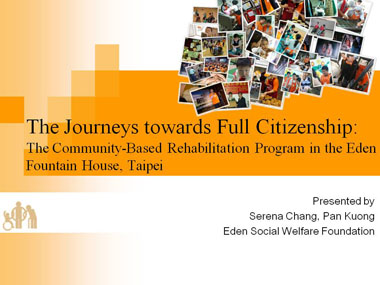 (Slide1 text)
(Slide1 text)
Slide2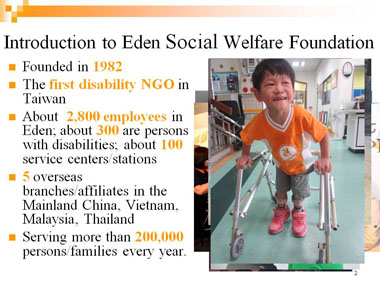 (Slide2 text)
(Slide2 text)
Slide3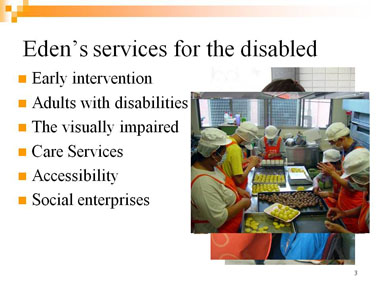 (Slide3 text)
(Slide3 text)
Slide4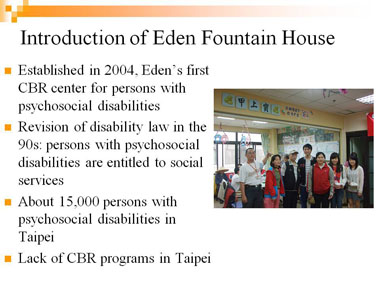 (Slide4 text)
(Slide4 text)
Slide5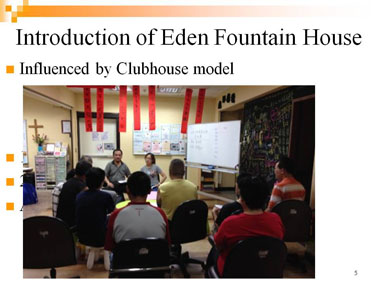 (Slide5 text)
(Slide5 text)
Slide6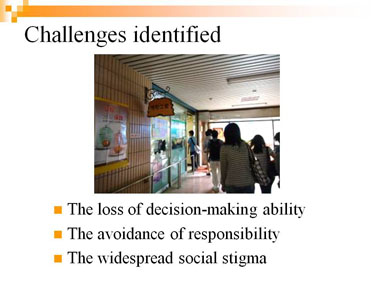 (Slide6 text)
(Slide6 text)
Slide7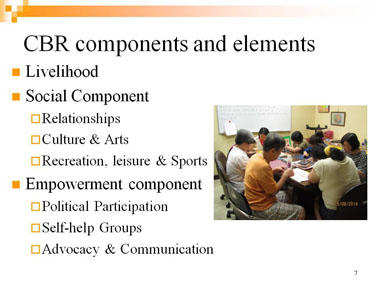 (Slide7 text)
(Slide7 text)
Slide8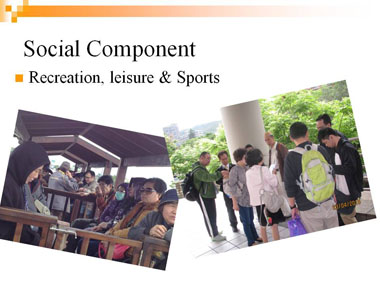 (Slide8 text)
(Slide8 text)
Slide9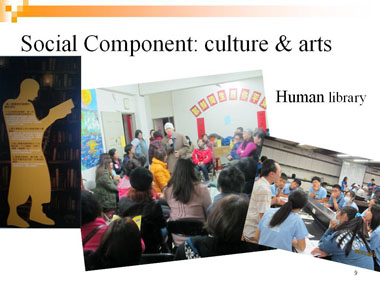 (Slide9 text)
(Slide9 text)
Slide10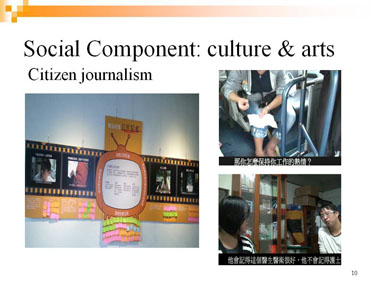 (Slide10 text)
(Slide10 text)
Slide11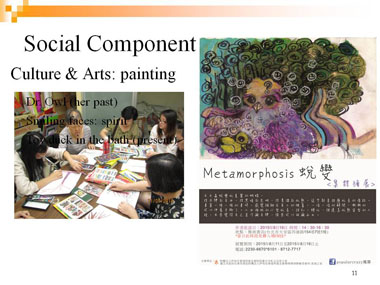 (Slide11 text)
(Slide11 text)
Slide12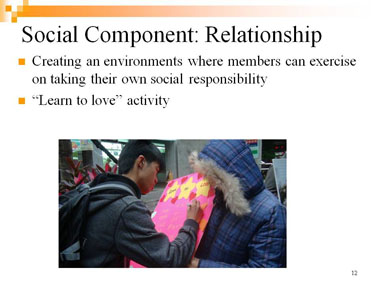 (Slide12 text)
(Slide12 text)
Slide13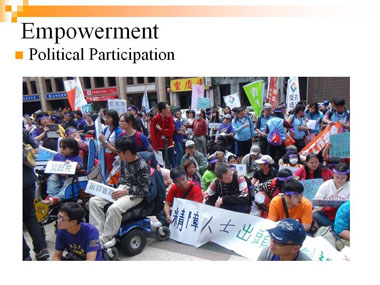 (Slide13 text)
(Slide13 text)
Slide14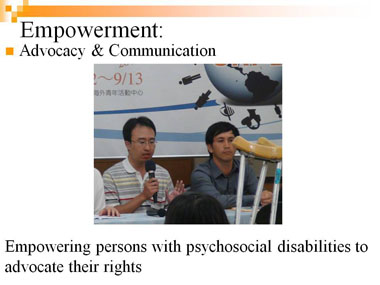 (Slide14 text)
(Slide14 text)
Slide15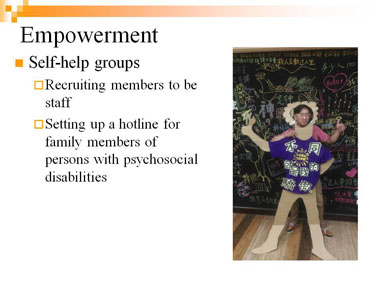 (Slide15 text)
(Slide15 text)
Slide16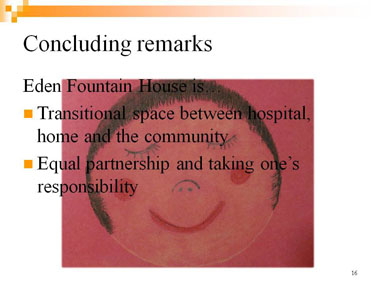 (Slide16 text)
(Slide16 text)
